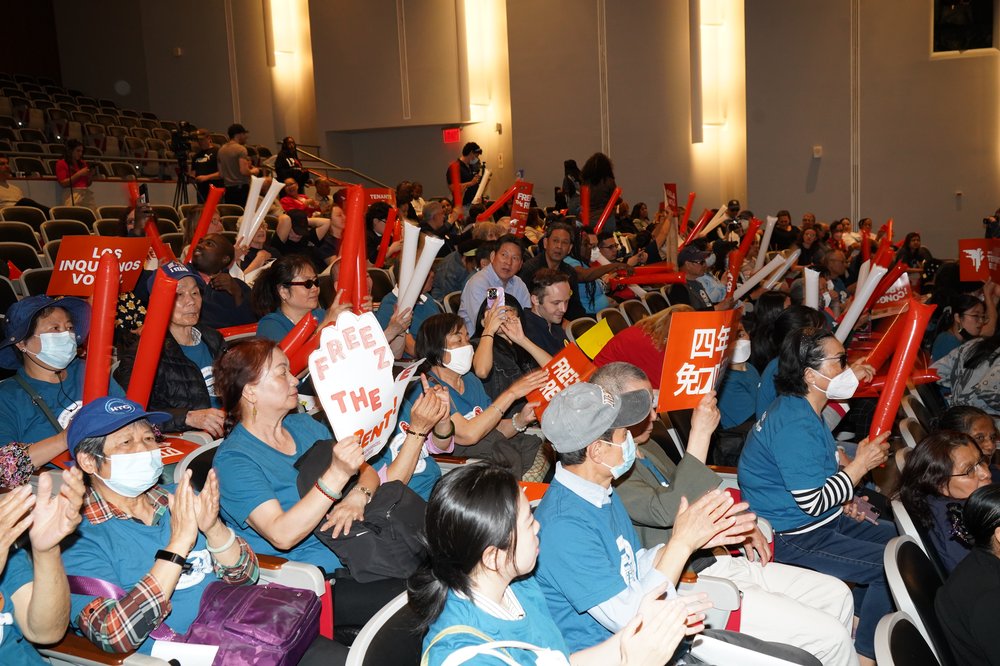NYC’s rent-stabilized tenants face increase as high as 7.75% under preliminary board vote
April 30, 2025, 7:40 p.m.
The Rent Guidelines Board voted on a range of increases for one- and two-year leases for rent-stabilized apartments at an annual meeting on Wednesday.

The panel that sets rent for tenants in roughly 1 million regulated apartments is considering an increase of 1.75 to 4.25% on new one-year leases and 4.75 to 7.75% on two-year leases.
New York City’s Rent Guidelines Board voted on the range at an annual meeting Wednesday night. The nine-member board uses the figures as a framework ahead of a final vote in late June.
The city will hold the first public hearing on the proposed increase on May 22 in Manhattan.
Hundreds of tenants and their advocates crowded the auditorium at LaGuardia College in Long Island City ahead of the vote. They banged noisemakers, chanted slogans and held signs calling for a rent freeze.
Landlord-aligned board members proposed increases of 6 to 8% on one-year leases and 8 to 9% on two-year leases. Tenant representatives countered with a more modest range: 0 to 1.75% on one-year leases and 0 to 3.75% on two-year leases.
Wednesday’s preliminary vote is nonbinding, but the board’s ultimate decision typically falls within the range, according to city records. Last year’s decision to raise rents by 2.75% came after the board considered increases ranging from 2% to 4.5%.
The board of mayoral appointees has voted to increase rents by a combined 9% over the past three years.
Board members, led by newly appointed Chair Doug Apple, considered multiple reports on tenant and landlord finances as well as expert testimony over the past month leading up to the preliminary vote.
The reports, prepared by Rent Guidelines Board staff, show tenants of rent-stabilized apartments have a median income of $60,000, well below the area median, and pay about 29% of their income toward rent. That figure means about half of all tenants living in rent-stabilized apartments are considered “rent-burdened.”
Tenant advocates have pointed to that data, along with the effects of inflation and the rising number of low-income New Yorkers now eligible for cash assistance, to support their calls to freeze rents at current levels.
The data also shows that landlords’ operating incomes rose overall, driven by large revenue increases in Manhattan south of 96th Street. But operating incomes also decreased in some parts of the city, like Staten Island and neighborhoods in the western Bronx.
Building owners say they need a rent increase to cover their own rising maintenance and operating costs, especially for the roughly 9% of properties considered distressed and facing potential foreclosure, according to board data.
This year’s Rent Guidelines Board decision has emerged as a major issue in the Democratic mayoral primary, with the vote likely to occur around Election Day. Seven Democratic candidates have called on the board to freeze rent — something the board has done on three occasions, all during Mayor Bill de Blasio’s tenure. Those candidates include state Assemblymember Zohran Mamdani, state Sen. Jessica Ramos, former Assemblymember Michael Blake, city Comptroller Brad Lander, Council Speaker Adrienne Adams, state Sen. Zellnor Myrie and former city Comptroller Scott Stringer.
Tenant organizers said the issue will be a defining one in this year’s mayoral election.
“Tenants are ready to vote for candidates who will make their lives better," said Cea Weaver, director of the New York State Tenant Bloc. "Freezing the rent would put $600 a month back in our pockets, so no one has to choose between rent and groceries. It is the single most powerful thing the mayor can do to make New York affordable. Tenants are the majority in New York City. If Adams won’t freeze the rent, we have the power to elect a mayor who will."
Mayor Eric Adams, who is running as an independent, told reporters Monday that the board should consider the finances of small property owners. Landlords with fewer than 100 rent-stabilized apartments own about 12% of New York City’s rent-stabilized apartments, according to a 2022 analysis by the nonprofit tenant organization JustFix.
“When you're not mayor, you can be so idealistic that you're not realistic,” Adams said Monday. “We need to figure out how to separate small property owners from the large property owners.”
After Wednesday's vote, City Hall spokesperson William Fowler criticized calls for a rent freeze as shortsighted.
“It’s easy to stand on the sidelines shouting simple slogans, but the reality is, allowing rent stabilized buildings to fall deeper into disrepair by freezing rent would only hurt rent stabilized tenants by subjecting them to worse living conditions and much larger rent increases in the future," Fowler said. "The benefit and purpose of rent stabilization is in the name itself — stability — both for tenants and their homes. Freezing the rent would put buildings in jeopardy, and all but guarantees that renters would face a much steeper increase in the future to keep up with costs.”
Former Gov. Andrew Cuomo, a leading candidate in the Democratic primary, called demands for a rent freeze a “politically convenient posture” in his housing plan.
“If landlords – small landlords in particular – do not receive rent increases that reflect their costs, they will be unable to maintain their buildings,” the plan states.
This is a developing story and may be updated.
Mayor Adams' administration proposes rent hike for people with NYC housing vouchers Gov. Hochul says NY budget will create $50M rental aid program championed by tenant groups NYC has a plan to fill empty affordable apartments — at least for now